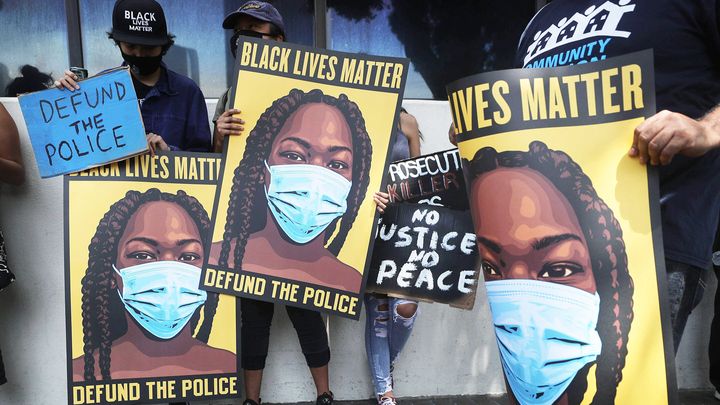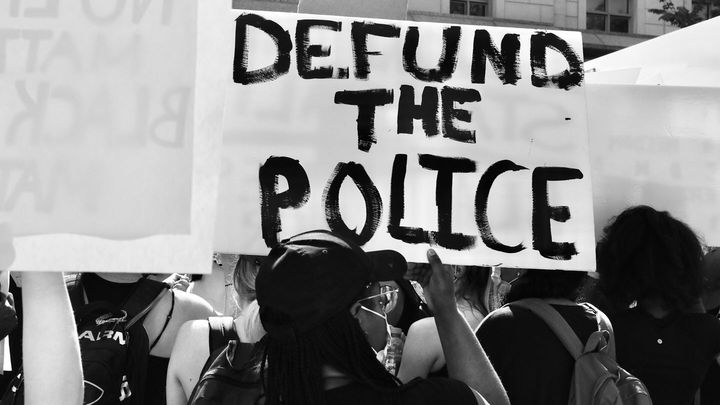Across the country, corporations and business elites partner with police foundations to funnel money from private donors to police departments with little oversight or public review. The funds raised by police foundations supplement police departments’ budgets and allow police to make controversial purchases of things like military weapons and surveillance technology without needing approval from city appropriators.
In Houston, long-range acoustic devices, SWAT equipment, and mounted unit equipment are among the items that have been purchased by the police department’s affiliated foundation, which is currently raising money for a $10 million training facility they call a “tactical village.” In Philadelphia, the police foundation has helped cops obtain long guns, drones, and other equipment for use by its SWAT units. In Los Angeles, the police foundation helped to finance the purchase of surveillance software from big data firm Palantir.
For years, police foundations and their corporate partners have operated more or less in the open, raising millions of dollars each year through posh ballroom galas, road races, luncheons, and other events. But with calls to defund the police following the Minneapolis police’s killing of George Floyd, activists and social justice groups have begun scrutinizing the foundations and calling on companies and individuals affiliated with them to cut ties.
Facing pressure from activists, police foundations in New York, Washington D.C., Seattle, and Philadelphia have recently scrubbed their websites to hide information about their partner organizations and board members, Sludge has found. In many cases, the corporations and individuals who have had their affiliations with police foundations hidden from public view have made public statements that they support Black Lives Matter and stand with the protesters.
At some point between June 10 and June 15, the Seattle Police Foundation deleted all information from its website about its partners and the members of its board of directors, according to a review of archives from the Wayback Machine. Where there was once a list of hundreds of the foundation’s 2019 partners, broken out into multiple tiers based on the amount of money they donated, as well as links to view event sponsors, there is now a message that reads “This page got away! Please use the navigation above to return to the site.” The same message is now displayed on the webpage that once listed the names and affiliations of the foundation’s board members.
The Seattle Police Foundation appears to have taken down these pages after Little Sis, a research project of the nonprofit Public Accountability Initiative, tweeted a graphic showing that major corporations like Starbucks, Amazon, and Facebook are either partners to the foundation or have executives on its board.
Archived versions of the pages that were taken down by the Seattle Police Foundation can be viewed through the Wayback Machine: partners and board of directors.
The Philadelphia Police Foundation took down information from its website as multiple universities that were listed as partners have faced protests from activists calling on them to cease their support for the group.
As of early June, visitors to the Philadelphia Police Foundation site are now met with a splash page that contains a statement about the killing of George Floyd and a way for people to donate to the foundation. Before the splash page was put up, the foundation displayed some of its partners in a gallery on its homepage and maintained a more complete list of partners on a separate page. The foundation’s board of directors members were listed on its “About” page. Both the partners page and the “About” page have now been set to redirect visitors to the splash page, which contains none of that information and has no links for people to navigate to it.
According to an archived version of the site accessed through Wayback Machine, the Philadelphia Police Foundation’s partners include gas station chain Wawa, Temple University, Independence Blue Cross, AmeriHealth, Johnson Controls, and several other companies and foundations. A “partner” page that is no longer publicly accessible and has not been archived since 2015 lists several other major corporations as “platinum sponsors,” including Target, Sunoco, 7-Eleven, and Comcast. Its board includes individuals affiliated with Comcast, Drexel University, 7-Eleven, M&T Bank, Philadelphia news station 6 ABC, and more.
Like in Seattle, the Philadelphia Police Foundation took down its information after activists began taking aim at its partners. In late May, Toorjo Ghose, an associate professor in the School of Social Policy and Practice at the University of Pennsylvania, published a petition calling on the university to take several steps to end its collusion with the police. Among its demands is for the university to end its support for “organizations that support the implementation of militarized policing in our communities,” which Ghose told the Philadelphia Inquirer includes the Philadelphia Police Foundation. (On June 24, Penn tweeted that it would no longer support the foundation.)
Another petition, created by students at Temple University, calls out the school and its health care affiliates, Temple Health, for being corporate sponsors of the foundation. After student protests on campus earlier this month, President Richard Englert announced on June 26 that Temple University would no longer provide financial support to the foundation.
On June 5, social justice coalition Philly We Rise posted information on its site about the individuals and entities that back the Philadelphia Police Foundation, calling on board members to resign and corporate partners to end their relationships and make donations to local bail funds.
The New York City Police Foundation removed the names of its board of trustees members from its website at some point between May 31 and June 5, according to archived captures of the site from the Wayback Machine that were reviewed by Sludge.
According to the most recent saved version of the page from May 3, New York City Police Foundation’s board is chaired by Andrew Tisch, the co-chair of Loews Corporation. Real estate developer Benjamin Winter serves as the foundation’s vice chairman, and Robert Tucker, the chairman and CEO of T&M Protection Resources, is the secretary/treasurer.
Other board members include corporate lobbyist and major Andrew Cuomo donor Tonio Burgos, who is a member of the Democratic National Committee’s Executive Committee; former Pepsi CEO and current Amazon board of directors member Indra Nooyi; and William Lewis Jr., managing director and co-chairman of investment banking at Lazard.
A page listing major donors has also been taken down, but it’s unclear exactly when. Donors who were listed on that page include Goldman Sachs, JP Morgan Chase, American Airlines, Bloomberg, Purdue Pharma, Target, Ivanka Trump, Apollo Global Management’s Mark Rowan, and others, according to a review of an archived copy.
Racial justice organization Color of Change put out a petition in late May calling on BlackRock CEO Larry Fink, who has publicly said he supports Black Lives Matter, to stop supporting the New York Police Foundation. The group’s deputy senior campaign director, Jade Magnus Ogunnaike, told Sludge that it is incompatible for Fink and other people and organizations to fund police foundations while saying publicly that they support the protesters.
“You can’t say that Black Lives Matter but funnel money to support a foundation that supports the very people who are harassing and terrorising protesters who are simply outside protesting and affirming Black lives,” Ogunnaike said.
“It’s very interesting that the police foundations have taken down their pages and it shows that there is not transparency at all with the police foundation at this point,” Ogunnaike said. “It shows that these institutions are not actually interested in backing up their statements that Black Lives Matter. They’re interested in controlling the public perception of themselves.”
In Washington D.C., the city’s police foundation put its board of directors list behind password protection at some point in early June, blocking public access to the list of names.
According to an archived copy of the D.C. Police Foundation’s website, its board co-chairs are retired steel industry lobbyist Terrence Stroub and while collar defense attorney Mark Tuohey, whose clients have included Enron and former Ohio Rep. Bob Ney, who was convicted on corruption charges relating to Jack Abramoff’s first lobbying scandal.
Other board members include lobbyist Heather Podesta, who federal clients include 3M, Apple, and GlaxoSmithKline; former assistant attorney general in the Obama administration Lanny Breuer, who is now vice chair at law firm Covington & Burling; GEICO senior attorney Larry Hinton; and many more individuals with ties to powerful corporations.
The role of police foundations in funding police departments was thrust into the spotlight on June 18 by Little Sis, which published a viral article highlighting the corporate partners of multiple foundations. The article has received tens of thousands of retweets and more than 17,000 unique pageviews, according to analytics information provided by Little Sis. It prompted follow up articles at The Guardian, OneZero, and NonProfit Quarterly, and was covered on Pod Save the People, a popular political podcast that last year averaged nearly 2 million downloads per episode.
Sludge asked all of the police foundations mentioned in this article why they recently took down or blocked access to information on their websites, but none of the foundations responded.
Read more from Sludge:
Verizon and AT&T Partner With Pro-Police Militarization Lobbying Group
Poorer Cities Spend More of Budget on Police, Even Where Crime Is Lower
Law Enforcement PACs Give Millions to the Politicians Who Set Their Budgets



